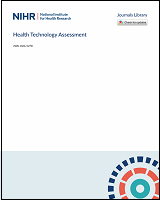NCBI Bookshelf. A service of the National Library of Medicine, National Institutes of Health.
Brazzelli M, Aucott L, Aceves-Martins M, et al. Biomarkers for assessing acute kidney injury for people who are being considered for admission to critical care: a systematic review and cost-effectiveness analysis. Southampton (UK): NIHR Journals Library; 2022 Jan. (Health Technology Assessment, No. 26.7.)

Biomarkers for assessing acute kidney injury for people who are being considered for admission to critical care: a systematic review and cost-effectiveness analysis.
Show detailsThe overall objective of this assessment was to summarise the current evidence on the clinical effectiveness and cost-effectiveness of using the NephroCheck® test (Astute Medical, Inc., San Diego, CA, USA), the ARCHITECT® and Alinity i™ urine neutrophil gelatinase-associated lipocalin (NGAL) assays (Abbott Laboratories, Abbott Park, IL, USA), and the BioPorto urine and plasma NGAL tests (BioPorto Diagnostics A/S, Hellerup, Denmark) to help assess the risk of acute kidney injury (AKI) in critically ill hospitalised patients who are considered for admission to critical care. AKI is still a challenging clinical problem for hospitalised patients, especially for those in need of critical care. Earlier detection of kidney injury may facilitate the adoption of strategies to preserve renal function and prevent further progression of kidney disease.
There are several components to this assessment that fall within the scope of the following research questions:
- Do novel biomarkers (i.e. the NephroCheck test, ARCHITECT and Alinity i urine NGAL assays, and BioPorto urine and plasma NGAL tests) accurately detect emerging AKI in critically ill people who are considered for critical care?
- Do the novel biomarkers (i.e. the NephroCheck test, ARCHITECT and Alinity i urine NGAL assays, BioPorto urine and plasma NGAL tests) predict the development of future events [e.g. AKI, mortality, need for long-term renal replacement therapy (RRT)] in critically ill people at risk of developing AKI who are considered for admission to critical care?
- Does the use of novel biomarkers (i.e. the NephroCheck test, ARCHITECT and Alinity i urine NGAL assays, and BioPorto urine and plasma NGAL tests) lead to improvements in clinical outcomes of critically ill people who are considered for admission to critical care (i.e. reduction in events rates, such as mortality and long-term RRT, among patients whose management is guided by the novel biomarkers)?
- Does routine use of novel biomarkers (i.e. the NephroCheck test, ARCHITECT and Alinity i urine NGAL assays, and BioPorto urine and plasma NGAL tests) affect costs to the NHS, length or quality of life [i.e. quality-adjusted life-years (QALYs)], or cost-effectiveness, measured as incremental cost per QALY gained for critically ill people who are considered for admission to critical care?
In brief, the main objectives of this assessment were as follows:
- to determine the diagnostic accuracy, prognostic accuracy and clinical impact of the use of novel biomarkers (i.e. the NephroCheck test, ARCHITECT and Alinity i urine NGAL assays, and BioPorto urine and plasma NGAL tests) for the assessment of AKI in critically ill patients (adults and children) who are being assessed for admission to critical care
- to develop an economic model to assess the cost-effectiveness of the use of novel biomarkers (i.e. NephroCheck test, ARCHITECT and Alinity i urine NGAL assays, and BioPorto urine and plasma NGAL tests) for the assessment of AKI in critically ill patients (adults and children) who are considered for admission to critical care.
- Objectives - Biomarkers for assessing acute kidney injury for people who are bei...Objectives - Biomarkers for assessing acute kidney injury for people who are being considered for admission to critical care: a systematic review and cost-effectiveness analysis
- Qualitative study: methods - A pragmatic randomised controlled trial of the effe...Qualitative study: methods - A pragmatic randomised controlled trial of the effectiveness and cost-effectiveness of ‘PhysioDirect’ telephone assessment and advice services for physiotherapy
- List of abbreviations - Individual cognitive stimulation therapy for dementia: a...List of abbreviations - Individual cognitive stimulation therapy for dementia: a clinical effectiveness and cost-effectiveness pragmatic, multicentre, randomised controlled trial
- Introduction and background - Strategies for older people living in care homes t...Introduction and background - Strategies for older people living in care homes to prevent urinary tract infection: the StOP UTI realist synthesis
- Results of process of care and the clinical outcomes - The Age of BLood Evaluati...Results of process of care and the clinical outcomes - The Age of BLood Evaluation (ABLE) randomised controlled trial: description of the UK-funded arm of the international trial, the UK cost–utility analysis and secondary analyses exploring factors associated with health-related quality of life and health-care costs during the 12-month follow-up
Your browsing activity is empty.
Activity recording is turned off.
See more...